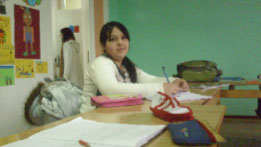
Manuela Ilic, one of the fourth form students who attend additional classes in the primary school “Sestre Ilic” in Valjevo
Parents of Roma pupils participate in school boards and committees in five primary schools in Valjevo.
The ongoing Roma Decade 2005-2015 is implemented in the countries of Central and Eastern Europe. The Republic of Serbia also joined this initiative in order to raise socio-economic standards, promote inclusion, improve health and increase employment. According to the UN assessments, 450,000 to 500,000 Roma live in Serbia. The data from 2003 Census indicate that 108,000 live in Serbia. Being one of the most vulnerable categories of population, reproduction of poverty is most frequently present with the Roma and this is what the Poverty Reduction Strategy also emphasizes.
One of the gravest problems of the youngest Roma is education. Because of being poor, the Roma families cannot afford new clothes and schoolbooks for their children. The general opinion is that it is much better for children to work than to go to school. The problems such as strong prejudices and discrimination also impact the enrollment of Roma children into schools.
According to Unicef data, over 70% of the Roma population in Serbia is functionally illiterate. Only 76% of children enroll into primary schools, but the poor living conditions and lack of understanding environment result in only 7% of them passing into secondary schools.
The project entitled “Education of Roma – Solution for the Future” is ongoing in five primary schools in Valjevo. The objective of the project initiated by an NGO – Roma Centre for Democracy” and supported by the school board for Kolubara and Macva districts at the Ministry of Education and the local government, is involvement of Roma parents into managerial structures.
“The involvement of Roma parents into school boards and parents’ committees has contributed to improvement of the position of Roma students. This also fulfills a wider aim – improvement of the level of education of Roma children” says Zorica Jocic, M.A., head of school board for Kolubara and Macva districts in Valjevo.
The idea was launched by the Roma Centre for Democracy that contacted the school board asking expert advice in preparation and implementation of the project.
The municipality also took part in this project financed by REF – Roma Education Fund from Hungary.
Some 15 parents listened to presentations of different topics: introduction to the school system, motivation, decision-making, combating prejudices. The majority took part in the drafting of school action plans immediately. The attendance of parent-teacher meetings became regular. Motivation was improved among compatriots to enable their children to attend schools. Local MPs in Valjevo have voted for Roma parents to become members of three primary schools’ boards, which is a precedent in Serbia.
Principals and teachers were also educated at the same time. Experiences were exchanged. This resulted into introducing the needs and priorities into school development plans so as to offer Roma students quality education, decrease the number of absentees and improve attainment.
Manuela Lukic, a fourth form pupil in the primary school Sestre Ilic is a good student. She says she likes school and is absent only when ill. “I would like to be a hairdresser when I grow up”. She says she does not find additional classes difficult for she knows she would do better. She wants to be marked “very good” at the end of the fifth form.
In the primary school Nada Puric, in a local community hosting a Roma, unhygienic settlement, Roma pupils may take a bath in the school bathrooms. Other schools have organized actions of distribution of clean clothes, second-hand text books, free snacks are regular. Preparatory classes for exams are organized for eight form pupils.
 Government of the Republic of Serbia
Government of the Republic of Serbia















 pdf [271 KB]
pdf [271 KB]
Leave a Comment